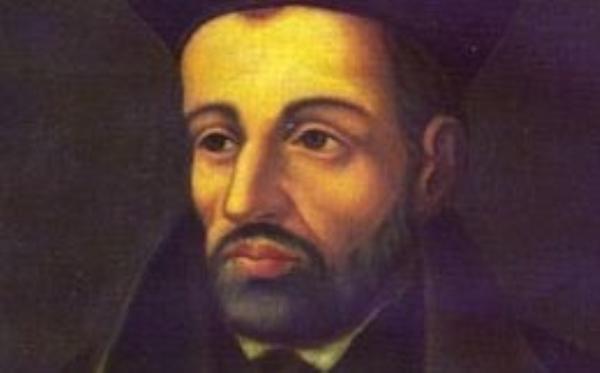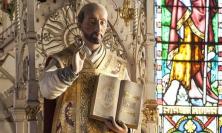
Today, 2 August, we celebrate the Feast of Blessed Pierre Favre, one of Ignatius’s initial companions and the first of that group to be ordained a priest. His story is little-known, unlike those of his close friends, Ignatius Loyola and Francis Xavier, but those who do know it consider his absence from the list of Jesuit saints to be curious. Edel McClean introduces this early Jesuit who was admired by all who knew him but plagued by self-doubt.
Walking around the magnificent Jesuit churches in Rome, one sees the great Ignatian figures everywhere. We have Ignatius, Spiritual Exercises clasped to his chest, eyes cast heavenwards; Francis Xavier, his cross held aloft; Robert Bellarmine, Francis Borgia, a veritable ‘Who’s Who’ of the history of the Society – with one, remarkable absence. The ‘first companions’ were three men – Ignatius, Xavier and Pierre Favre. Favre was, for many years, second in command to Ignatius, the first of the group to be ordained, a man eagerly sought out in 16th century Europe. For many years in Paris this band of three shared a room, a common purse and common purpose, yet while Ignatius and Xavier were sainted, Favre remains humbly ‘blessed’.
Even finding an image of Favre is difficult, and those that do exist most often present him as dark-haired, small and severe, when in fact he was fair-haired, tall and kind. Even in his native Savoy, the chapel built on the Favre farm, while clean and much-visited, has seen better days. The local church shop in Le Grand Bornand has run out of the only prayer card bearing his image. In Annecy, asking after Favre’s hidden-away statue in the grounds of L’Eveche, you are more likely to be pointed towards the Cathedral of St Francis de Sales.
Favre was born in the parish of St Jean de Sixt in Savoy in 1506. His family were not breadline peasants but they were working farmers, with hands in the soil of the foothills of the Alps. Pierre, the eldest of three boys, was a bright spark. Destined for the life of a farmer, he so pined for knowledge that his parents relented and sent him to school, first in nearby Thones, then further afield to La Roche. He lived with one foot in the world of learning, with close family ties to the local Carthusian monastery and its select library, and access to the hugely respected teacher, Peter Velliard. His studies, however, did not excuse him his summer duties and until he left for Paris aged 19, he spent his summers alone in the high grasslands of the Alps with the family herds. He learned to watch, to endure and persevere, to stay safe, to give the mountains their due. The life of a literal good shepherd would have been second nature, since every animal in his flock would have been crucial to his family’s livelihood. In later years he no doubt understood, better than his noble friends, the farming parables of Jesus, because he lived them from his birth. His natural ability with the people he met reflects an early life in which he, unlike many of his companions, had had a close connection to the earth and to its people. To put on airs and graces would have been, to use an Irish idiom, to ‘jump out of the bowl he was baked in’.
The wandering apostle
In 1525, Favre left Savoy for university in Paris, and the Collège Sainte-Barbe. To all intents and purposes he excelled – he was a gifted scholar – but he was interiorly anguished. A devout young man, he struggled with his sense of his own sinfulness, with indecision, and with a constant fear of offending God. It was from this darker interiority that Ignatius came to rescue him. Although 15 years his junior, Favre was many years ahead of Ignatius in study and, always a generous soul, dedicated himself to helping the Spaniard. In turn, Ignatius turned his hand to helping young Favre to deal with his anxieties (although waiting four years before allowing him to make the Exercises). Years later, Favre recalled:
… he gave me an understanding of my conscience and of the temptations and scruples I had had for so long without either understanding them or seeing the way by which I would be able to get peace.[1]
Ignatius saved Favre’s skin, though it could also be said that Favre saved Ignatius’s – the latter is unlikely to have survived some of the rigours of college life without Favre’s solid, steady, reasoned learning.
Paris was formative for Favre. He met Ignatius, Xavier, and the others who were to join their band of brothers. He made the Exercises, extended the friendship formed in his boyhood with the Carthusians, learned the tools of discernment, was ordained a priest, was educated in humanistic theology, and resolved to enter into a new way of life with the embryonic Society. In Paris, too, he began to grasp what was to be the crux of his life’s work, as he had his first connection with what he was to call ‘the heretics of this age’. The teachings of Luther and his contemporaries would have been discussed in the lecture halls and rooms of the universities where Favre engaged in eclectic theological studies, but this was also a crisis spilling out into the streets of Paris. As a university student, Favre would have been obliged to attend the execution of heretics, some as young as 14. Such brutality would have burned the soul of the gentle shepherd and years later, fully grasping the breadth of the Reformers’ challenge, he urged friendship, not judgement:
Anyone helping the heretics of this age must be careful to have great charity for them and to love them in truth, banishing from his soul all considerations which would tend to chill his esteem for them. We need to win their goodwill, so that they will love us and accord us a good place in their hearts. This can be done by speaking familiarly with them about matters we both share in common and avoiding any debate in which one side tries to put down the other. We must establish communion in what unites us before doing so in what might evince differences of opinion.[2]
After eleven years, in 1536, Favre left Paris, making a slow journey to Rome via Venice. In the following three years in the towns of Northern Italy, he and various members of a growing band of men engaged in a variety of ministries including, for Favre, lecturing in theology and scripture. In 1539 Pope Paul III asked for Favre to be sent to Palma, and so began what was to become his wandering apostolic life, being sent hither and thither across Europe, wherever there was felt to be great apostolic need. His travels took him to Spain, Portugal, Germany, Belgium, France, Switzerland and into the crucible of Reformation Europe. It is estimated that he travelled 7,000 miles ‘as the crow flies’. Since he was travelling by foot, and since physical and political boundaries made travel difficult, the true figure is likely to be closer to 14,000. He did not return to Rome and his beloved Ignatius until 1546, and died only two weeks later.
Favre’s main gift to us is his Memoriale, a journal he kept for the last four years of his life. Unlike Ignatius, he did not have an audience in mind, and if he had not died so quickly he would no doubt have destroyed it. As it is, perhaps out of a desire to protect his reputation, the text was not published until three centuries after his death. The text consists of musings between himself and God, and one cannot read the Memoriale without feeling that you are getting almost too close, too intimate an insight into his sometimes tortuous reasoning. He writes sometimes to himself – berating, challenging, commanding; and sometimes to God, begging, thanking, repenting. Sometimes he records his activities, but this is more with the intention of discerning them than recording them for curious future generations. The Memoriale and his few other surviving letters deserve to be better known for there are treasures to be found. Two themes that emerge most strongly are Favre’s approach to ministry, and his engagement with discernment.
Approach to ministry
Favre’s apostolic style was based around friendships, engaging in spiritual conversation, hearing confessions and giving the Exercises. He becomes that good shepherd, willing to go out, to travel the highways and byways in search of the ‘lost sheep’. He walks miles between cities, and within cities, seeking out conversation, trusting always that God is at work. He explains how, on journeys, he seeks to be alert to opportunities around him:
While staying in inns, I have always felt inspired to do good by instructing and encouraging people… it is very good to leave in the inns and houses where we happen to stay some trace of good and holy behaviour, for everywhere there is good to be done, everywhere there is something to be planted or harvested.[3]
Those he cannot reach by foot he seeks to reach by prayer. He was, as Michel de Certeau puts it, ‘a minister of invisible kindness that had descended from the heights’[4], and the breadth and reach of his prayer is extraordinary. Travelling through Germany and seeing at first hand the effects of the Reformation, his prayer remains astoundingly generous:
I felt great fervour as eight persons became present to me along with the desire to remember them vividly in order to pray for them without taking notice of their faults. They were the sovereign pontiff, the emperor, the king of France, the king of England, Luther, the Grand Turk, Brucer and Philip Melanchthon.[5]
In prayer he turned to angels, saints well-known and otherwise, those deceased whom he had loved, Mary and, above all, to Jesus. He prayed for himself, for his many spiritual friends, for those he encountered, for the great decision-makers of Europe and for those who caused his own soul so much unquiet. A modern reader might detect a certain simplicity in Favre – he had an almost embarrassing devotion to some questionable relics, for example – but he was a man of his time, and a man who had grown up in deeply pious Savoy. He defends the prayer of simple folk at least in part because, even with all his learning, it remains his own prayer.
He longed for stability, to be able to stay in one place and nurture those friendships which he valued so much, but there was always another call to somewhere where the need was greater and so he would find himself back on the road. At one point he writes, somewhat sadly:
Our Lord only knows the reasons why I do not deserve to stay in one place for any length of time but am always being taken away at the moment when the harvest begins to peak.[6]
The perpetual call to move onwards embraced the poverty, humiliation and humility of the Two Standards of the Exercises[7]. Favre did not seek his own benefit or expect to be greeted as a celebrity, nor is there any complaint about the strains and dangers of being on the road. His manner was warm and open-hearted; he himself describes ‘my old style of embracing much and pressing little’[8]. This approach endeared him to Church and State leaders, and to the general populace as well as those who laboured alongside him. Core to Favre’s way of operating in the world is his belief that people are changed more by those who love them in God’s grace than by those who seek to argue, outwit or overcome them. His great gift was in his ability to come alongside people so that they loved him and knew themselves to be loved by him. From this place, and only from there, he exhorted them, pushed them to push themselves; he encouraged them to catch a glimpse of just what God could make of them, if they just allowed him a chance.
Engagement with discernment
Perhaps what emerges most from the pages of the Memoriale is the character of the man himself. While in Paris, Ignatius gave Favre the tools to live with his temperamental nature, but not to defeat it. His sensitivity, openness and huge humility were to become his greatest strengths. His tremendous strengths, however, were also his tremendous weaknesses. He recognises the bad spirit and labours endlessly to resist, but cannot change his susceptibility to its insistent demands. One of the great sadnesses is that he was so perpetually dissatisfied with himself, unable to see or rejoice in the work that God was doing through him. What others could see, he himself could not. Using the language beloved of an ‘X Factor’ generation, it might have been said to Favre: ‘you don’t know just how good you are’. It is hard not to be shocked at the way Favre sometimes addresses himself in his writings. He derides himself for his sadness, his lack of tears, his coldness in prayer, his distractions and temptations, for not speaking or writing in the right spirit, ‘committing so many senseless deeds and so many acts of ingratitude and of ill will’[9]. Whatever the face this kind, holy man presents to the world, internally he is constantly at work, labouring hard against the temptation to despair of himself.
It is here that the skills of discernment taught to him by Ignatius were so essential. He learned to recognise that his loss of hope for himself was not of God, and in the Memoriale he frequently engages in self-encouragement:
I became conscious in many ways of that misery of mine which comes from my imperfections and my deficiencies above all in the conduct and affairs… In these moods of depression, this single consideration brought me some spiritual comfort: I saw that God was favourable to me. If I retain the certainty and the awareness of God’s presence in me, he will make of me what I can and should be.[10]
Ultimately, each of his turns into despair and depression cause him to pray fervently to God. He cannot cope without God, and he faces all his suffering, his struggles and the daily dangers because of his absolute love of God and his ever-growing conviction that God is coming to him and calling him onwards. It is this, perhaps, that made him so gifted in discernment – he had to engage with it himself, minute-by-minute – and because of this he became the one who, according to Ignatius, gave the Exercises better than anyone.
In all the other desires that emerge through the Memoriale – and there are desires expressed in virtually every paragraph – one stands head and shoulders above all others:
I asked that he might teach us how to praise and honour him, to think about and know him; how to remember him, long for him, love, desire and serve him; how to seek to see and hear him, to perceive his fragrance, to delight in him and touch him.[11]
A deepening of prayer and of unity with God is evident as the Memoriale progresses. Favre’s prayer becomes simpler, more direct, less focused on his apostolic activities and more focused on trust in God. God does not respond to Favre’s frequent requests for his instability to be removed. That instability, however, serves both to feed Favre’s love and compassion for those he meets, and to increase his understanding of his utter dependence on God as his only possible source of stability.
‘He... stole into their souls’
Perhaps the greatest attraction to Favre is the humanity that, thankfully, hagiography has not been able to stamp out. Favre was not confident. His faith in God is unshakeable but his faith in himself is non-existent. Whereas contemporary medicine would have probably medicated the man (he may well have suffered from clinical depression), his only recourse was to God. It is here that he is at his most comforting. He was a good man, who did great work. He was much loved, yet he never ceased battling with the voices that told him otherwise. For those who engage in a similar battle, Favre is a trusted friend who can give solid advice precisely because he has been there before us:
Simplicity and goodness should eventually get the upper hand over our natural way of thinking. That is to say, though on a natural level we might think it right to be angry or depressed over something, nevertheless goodness and simplicity ought to put up with it. Sometimes we are interiorly anguished; and though this spirit may speak what is true, reproving us for our many failures, nevertheless if it robs us of our tranquillity it is not the good spirit. The spirit of God is peaceful and gentle, even in reproof.[12]
They say that saints are sinners who never stop trying, a truth that could certainly be applied to Favre. He knew the bitter taste of disappointment in himself. He understood what it was like to fight the same battle repeatedly, only to find himself back where he had begun. But to an even greater depth he knew the Christ who ‘consoles, helps, delivers, heals, liberates, saves, enriches and strengthens’[13]. It was this Christ who he served and bore witness to, and to whom his writings continue to bear witness. ‘Things can be very bleak’, his writings tell us, ‘and you may be battling with thoughts you would be reluctant to give voice to, you may not like yourself very much, but Christ is there to console and liberate and strengthen’.
Why did Favre not join Ignatius and Xavier in the bands of the saints? We can only speculate. He came from farming stock in Savoy, not a powerful nation state, whereas his two companions were noblemen. Ignatius and Xavier were both preachers by nature, but Favre won souls in conversation and was never confident in his preaching. The deeply humble Favre might not mind so much that his face is not in evidence in Rome’s churches; he was not a man to seek out the limelight, and was forever pointing away from himself towards Jesus. It is not Favre who misses out from not being given his rightful place, it is us. We can only gain from the inspiration of a man who one of his contemporaries described thus:
There was an especially rare and delightful sweetness and charm in his relations with other men which I must confess to this very day I have not found in any other. In some way or other, he so won the friendship of other men and gradually stole into their souls, that by his whole manner, and the gentleness of his words, he irresistibly drew them to a love of God.[14]
Edel McClean is a member of the team at Loyola Hall Jesuit Spirituality Centre.
[1] ‘Memoriale’: The Spiritual Writings of Pierre Favre (Saint Louis: The Institute of Jesuit Sources, 1996) §9, p. 65.
[2] ‘To Diego Laínez, on Dealing with Heretics’ in Spiritual Writings of Pierre Favre p. 379.
[3] Memoriale §433, p. 309.
[4] De Certeau, Michel (2006) ‘Pierre Favre and the Experience of Salvation’ The Way 45/4 (2006), 21-40, p. 33.
[5] Memoriale §25, p. 79.
[6] ‘To Ignatius of Loyola, on Apostolic Activities in Mainz’ in Spiritual Writings, p. 339.
[7] The Spiritual Exercises of Saint Ignatius of Loyola, trans. Michael Ivens (Herefordshire: Gracewing, 2004) §146, p. 43.
[8] ‘To Diego Laínez, on Spiritual Graces Received’ in Spiritual Writings, p. 338.
[9] Memoriale §120, p. 137.
[10] Memoriale §238, p. 207.
[11] Memoriale §51, p. 96.
[12] ‘Instructions for Those Going on Pilgrimage’ in Spiritual Writings, p. 342.
[13] Memoriale §151, p. 157.
[14] Simon Rodriguez in 1577 (Monumenta Historica Societatis Iesu, Epistolae PP Paschasii Broeti Rodericii, p. 453).





